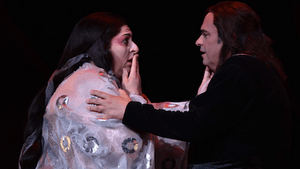Stay in the Loop
BSR publishes on a weekly schedule, with an email newsletter every Wednesday and Thursday morning. There’s no paywall, and subscribing is always free.
An overlooked classic
Opera Philadelphia's presents Puccini's 'Turandot'

Within three days Opera Philadelphia presented three new productions. One was a world premiere (Breaking the Waves), another an American premiere (South African troupe Third World Bunfight’s Macbeth). In all the deserved fuss about them, some folks might not have given adequate appreciation to Turandot.
It was the last composition by Giacomo Puccini, who was revered as the leading composer of verismo operas — that is, realistic dramas about ordinary people, such as La Boheme, and Il Tabarro, about a barge owner and his unhappy wife.
Even his opera set in faraway Asia concerned a typical American sailor and an ordinary teenage girl, Madama Butterfly.
Puccini's turnaround
Puccini made a turnaround with Turandot. This is a mythic tale about an empress and a prince who lack relatable human qualities. But Puccini invested this opera with other aspects — exotic orchestral coloring and overwhelming choral singing. He also added intentional dissonances that were unlike his earlier creations.
To obtain permission to marry the Chinese princess Turandot, a suitor must solve three riddles or he’ll be decapitated. Calaf passes the test, but offers the princess a way out of marrying him: if she is able to learn his name before dawn, he will submit to his execution. The princess was described by Carlo Gozzi, the Italian playwright of Turandot as a "tigerish woman" of "unrelenting pride."
Much of Puccini’s music veers toward the grandiose, which is appropriate for the story but different from everything he composed previously. The one exception is the character of Liù, Calaf’s adoring servant. When Turandot has Liù tortured, she chooses to commit suicide rather than reveal her master’s name. This situation is close to a real-life event. Puccini's wife Elvira accused their maid, Doria Manfredi, of having an affair with the composer, and Doria then committed suicide.
The music for Liù is warm and human, and her music is tender. After Puccini composed her death scene and funeral cortege, he was unable to continue with the climactic finale, even though the words were already written. Then he developed throat cancer and died unexpectedly while undergoing radiation treatment. The music for the conclusion had to be completed by Franco Alfano.
Is it Orientalism?
Though based on a Persian epic, the setting is an imaginary China. Some criticism has been leveled against Turandot as caricaturing the Chinese people. But in an era when fake Orientalism was prevalent, Puccini’s writing was more authentic than Gilbert and Sullivan’s The Mikado, Gustav Kerker’s The Pearl of Pekin, or Sigmund Romberg’s Cherry Blossoms. Puccini used a bit of Japanese music in Madama Butterfly and made an even greater effort here. To produce an Asiatic sensibility, the music is inflected with pentatonic motifs. Puccini used several Chinese melodies in the opera, including the folk tune "Mo Li Hua" (“Jasmine Flower”), which is sung by a children's chorus.
Bass Morris Robinson was imposing as Timur, and Joyce El-Khoury, an Academy of Vocal Arts graduate, virtually stole the show as Liù, floating ethereal high A’s. Corrado Rovaris conducted with passion, though he slowed the pace too much in some scenes.
Designer Andre Barbe and director Renaud Doucet used the symbolism of circles in this handsome production. They based the concept on the round moon and a large gong that announced each challenge.
As the princess and her suitor, this Philadelphia production presented artists who have already sung those roles at the Met and other major houses. Tenor Marco Berti, as Calaf, modulated his big voice with long, intelligent phrasing. Christine Goerke powerfully belted the princess’s commanding music. These characters were drawn to each other solely because of looks, as they hardly knew each other, so it would be nice to see the parts played by gorgeous actors. We’ll have to wait for that. Of course, what’s more important is vocal strength, which they do have.
What, When, Where
Turandot. By Giacomo Puccini, Renaud Doucet directed, Corrado Rovaris conducted. Through Oct. 2, 2016 at the Academy of Music, Broad and Locust Sts. (215) 732-8400 or operaphila.org.
Free HD telecast on Sunday, October 2 at 7 pm on the mall at Independence National Historical Park. operaonthemall.org.
Sign up for our newsletter
All of the week's new articles, all in one place. Sign up for the free weekly BSR newsletters, and don't miss a conversation.

 Steve Cohen
Steve Cohen